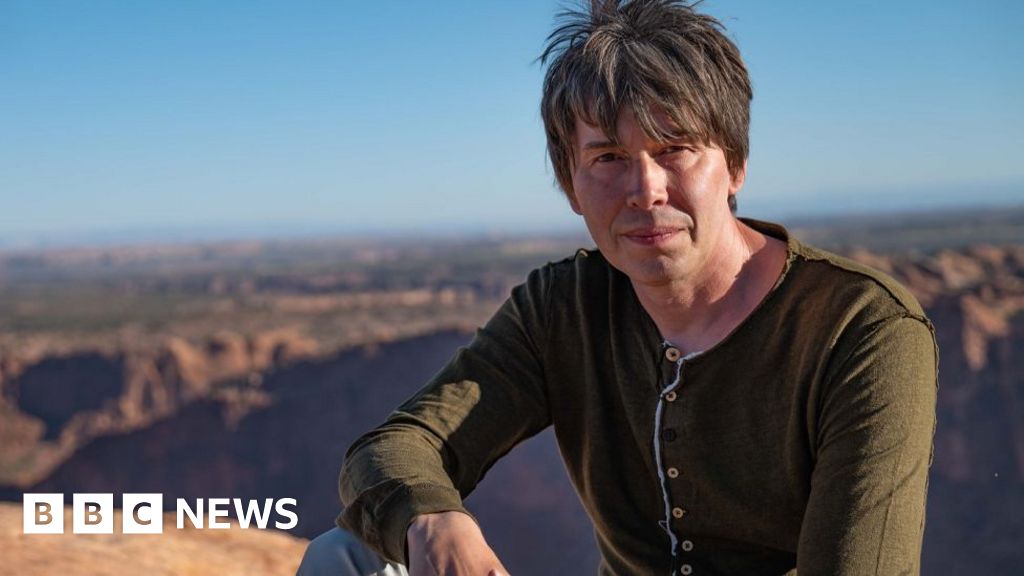Prof Brian Cox is a physicist and musician
Prof Brian Cox says he is prepared to boldly go where no British TV presenter has gone before.
“I’ve not yet raised the funds, or convinced someone to give me a ticket” to space, he explains.
But if Elon Musk, the owner of US aerospace company SpaceX came calling, then “I’d say… brilliant, up we go!”, he adds.
Travelling to space is something we could all be doing in the future, according to Prof Cox, the UK’s best-known particle physicist.
Speaking ahead of his new BBC Two series about the Solar System, he says he wants the human race to go further.
He says advances being made at some commercial space companies means there is a possibility that we could become a multi-planetary and interstellar civilisation.
Jared Isaacman steps out of the hatch at the start of the first private spacewalk
One person who has beaten Prof Cox into space is billionaire businessman Jared Isaacman and the crew of SpaceX’s Polaris Dawn.
Isaacman made history earlier this month by becoming the first private sector astronaut to walk in space. The US space agency Nasa said the mission represented “a giant leap forward” for the commercial space industry.
Prof Cox believes this combined approach – a collaboration between government agencies, like Nasa, and the private companies, like SpaceX – is a good thing. It is vital, he adds, to have cheap, reliable access to space.
“I really am of the view that our civilisation needs to expand beyond our planet for so many reasons,” he says.
Metallic frost caps the mountains of Venus. It is made up of lead sulphide, which Prof Cox holds in his hand
The aerospace company, Blue Origin – brainchild of billionaire and Amazon founder, Jeff Bezos – is already envisioning a future where people live and work in space, with industries perceived as damaging to Earth moved into the cosmos.
There are limited resources on the Earth and damage is being done to the planet through “civilisation’s thirst and requirement for more resources”, says Prof Cox, making it imperative we look towards becoming a multi-planetary civilisation.
Tapping into the universe’s resources, like mining asteroids, may sound like science fiction but, he says, “it’s extremely important that we do it, and as quickly as possible”.
Whether there is the political skill to achieve it as a civilisation is another matter, he says – but he believes we have a duty to explore our galaxy, the Milky Way, which is filled with hundreds of billions of stars.
There is plenty to explore in our Solar System alone. As well as the Sun there are eight planets, five officially named dwarf planets, hundreds of moons, thousands of comets, and more than a million asteroids.
There is no frontier here on Earth anymore, says Prof Cox
If forced to hazard a guess, Prof Cox says it is probable that we are the only advanced civilisation in the Milky Way at the moment, and possibly the only one that has ever existed in the galaxy.
“If that’s true, though, then our expansion beyond this planet becomes an obligation. Because if we don’t do that, nobody’s doing it. So if we don’t go out to the stars, nobody’s ever going out to the stars in this galaxy.
“So it becomes of overriding importance to begin to take those first steps.”
Mars and the Moon are the only two places Prof Cox could imagine seeing anybody visit and begin to build a permanent presence in his lifetime.
Despite asteroids the size of stadiums hurtling through the Solar System, he believes the biggest current danger to Earth is actually its human inhabitants.
“If anything’s going to destroy us, it’s probably us,” he says – although having said that, he says the possibility of an asteroid hitting the Earth is now being taken more seriously than when he first started making TV programmes more than 15 years ago.
“At some point, we’re going to have to move one,” he says.
Europa is locked by gravity to Jupiter and orbits the planet every three and a half days
For his new series, Prof Cox explores events happening in space via the latest missions. In October, Nasa’s Europa Clipper, will be setting off on a five-and-a-half-year journey to Jupiter – to explore whether the planet’s icy moon, Europa, could harbour conditions suitable for life. Scientists believe Europa has liquid water in the form of a large saltwater ocean beneath its icy crust.
But what might life on Europa look like if the conditions were right?
“It will be simple life,” says Prof Cox. “It will be single-celled life at the very best, or something that looks a bit like single-celled life… We’re not expecting multi-cellular life there – partly because it took so long to develop here on Earth.”
What could be on the horizon for our civilisation?
It has been more than 10 years since Sir David Attenborough named Prof Cox as his natural successor. So could he be ready to take on the mantle?
“I’m absolutely delighted that he doesn’t need a successor at the moment,” says Prof Cox, “he’s making more programmes than I do.”
When it comes to Sir David’s career, he says, it is not possible to succeed someone who has invented the form.
“You can’t really have a successor because he was the first to do it. It’s almost like saying: ‘Who will be the successor to Neil Armstrong as the first human to set foot on the Moon?’”
Solar System starts on Monday 7 October at 21:00 BST on BBC Two and BBC iPlayer.
Checkout latest world news below links :
World News || Latest News || U.S. News
The post ‘Human race needs to expand beyond Earth,’ says Prof Brian Cox appeared first on WorldNewsEra.

